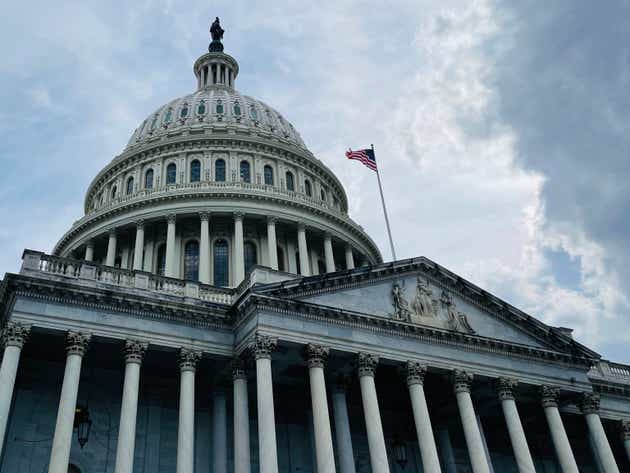Investors are bracing for a week of political wrangling in Washington after President Biden and House Speaker Kevin McCarthy inked a deal on the debt limit. Both sides now have to muster enough votes to win Congressional approval, despite some opposition from the likes of the Republican Freedom Caucus and progressives in the Democratic Party. While enough bipartisan support is expected to be eventually garnered, the measure could still run into some procedural obstacles, as the clock ticks down to avoid a catastrophic default by June 5.Legislative text: The agreement lifts the current $31.4T deal ceiling into 2025, meaning the limit on government borrowing would be extended until after the next presidential election. Non-defense spending will be capped at current levels for the next fiscal year, and only rise by 1% in 2025. Congress would also need to approve 12 annual spending bills or risk facing a snapback to spending limits from the previous year.Other changes that were central to the compromise included limiting some food stamp provisions to encourage recipients to find jobs. The agreement also halts some funds to hire new IRS agents, claws back billions of dollars in unspent COVID relief, and would speed up big energy projects through permitting reform. In addition, a pause on student-loan repayments will come to an end in August, though Biden's student loan forgiveness plan will end up being decided by the Supreme Court.Go deeper: U.S. stock index futures advanced following the release of the bill, with SA Investing Group Leader ANG Traders forecasting new market highs, though Mott Capital Management sees the potential for a deal draining a massive amount of liquidity from the market. The measure will be taken up this afternoon by the House Rules Committee, which will determine the framework for considering the legislation before a vote takes place in the House on Wednesday. If approved, a decision in the Senate would follow, and could happen by the weekend. (17 comments)

 | Read in Browser |
 |
| | Top News  Getty Images Investors are bracing for a week of political wrangling in Washington after President Biden and House Speaker Kevin McCarthy inked a deal on the debt limit. Both sides now have to muster enough votes to win Congressional approval, despite some opposition from the likes of the Republican Freedom Caucus and progressives in the Democratic Party. While enough bipartisan support is expected to be eventually garnered, the measure could still run into some procedural obstacles, as the clock ticks down to avoid a catastrophic default by June 5.
Legislative text: The agreement lifts the current $31.4T deal ceiling into 2025, meaning the limit on government borrowing would be extended until after the next presidential election. Non-defense spending will be capped at current levels for the next fiscal year, and only rise by 1% in 2025. Congress would also need to approve 12 annual spending bills or risk facing a snapback to spending limits from the previous year.
Other changes that were central to the compromise included limiting some food stamp provisions to encourage recipients to find jobs. The agreement also halts some funds to hire new IRS agents, claws back billions of dollars in unspent COVID relief, and would speed up big energy projects through permitting reform. In addition, a pause on student-loan repayments will come to an end in August, though Biden's student loan forgiveness plan will end up being decided by the Supreme Court.
Go deeper: U.S. stock index futures advanced following the release of the bill, with SA Investing Group Leader ANG Traders forecasting new market highs, though Mott Capital Management sees the potential for a deal draining a massive amount of liquidity from the market. The measure will be taken up this afternoon by the House Rules Committee, which will determine the framework for considering the legislation before a vote takes place in the House on Wednesday. If approved, a decision in the Senate would follow, and could happen by the weekend. (17 comments)
| | Featured  Research shows that individual investors collectively underperform the stock market, because their decisions are often driven by emotions. We believe that as an investor you can do really well if you find opportunities based on 360-degree analysis - not hype. Seeking Alpha Premium's unparalleled stock coverage gives you the insights you need to stay ahead of the curve. With timely insights on stocks, ETFs, and more, you can track the investments that matter most to you. Plus, you can discover hidden gems and compelling new ideas with our exclusive stock ratings. Go Premium and experience its incredible value for yourself. Go Premium now | | | | | Energy Tensions are reportedly rising between the world's biggest oil producers, as Russia continues to pump huge volumes of cheaper crude oil into the market and undermine Saudi efforts to boost prices. Last week, the Kingdom's energy minister issued a warning to oil speculators, signaling to the market that a further production cut was possible, but Moscow's deputy prime minister soon contradicted him by expressing doubts about further reductions. Remember that the two OPEC+ heavyweights entered an oil price war in 2020 over proposed crude production cuts, which sent prices crashing. However, don't count out a resolution, with the ties and relationship able to survive difficult dynamics like Russia's invasion of Ukraine. (161 comments)
| | Outlook Meet the newest candidate looking to identify as an ESG stock: Philip Morris (NYSE:PM). CEO Jacek Olczak believes that efforts - like pushing away from cigarettes towards devices like its IQOS heated tobacco stick - could set up the tobacco group for inclusion in one of the fastest-growing segments of the investment management industry. In fact, vapor-based nicotine alternatives accounted for about a third of Philip Morris' revenues in 2022, though others see an ESG classification as an inherent contradiction. Compounding the problem is that there's no standard framework that defines "environmental, social and governance," despite developments in areas like Europe, where many asset managers and pension funds have sold off tobacco stocks in response to ESG mandates. (7 comments)
| | Today's Markets In Asia, Japan +0.3%. Hong Kong +0.2%. China +0.1%. India +0.2%.
In Europe, at midday, London -0.6%. Paris -0.4%. Frankfurt +0.5%.
Futures at 6:30, Dow +0.2%. S&P +0.6%. Nasdaq +1.1%. Crude -1.2% to $71.80. Gold +1.5% to $1973.70. Bitcoin +0.1% to $27,893.
Ten-year Treasury Yield -10 bps to 3.72%
Today's Economic Calendar | | | | | Seeking Alpha's Wall Street Breakfast Podcast Seeking Alpha's Wall Street Breakfast podcast brings you all the news you need to know for your market day. Released by 8:00 AM ET each morning, it is a quick listen that you can put on as you get ready to start your working day. | | | | |










No comments:
Post a Comment